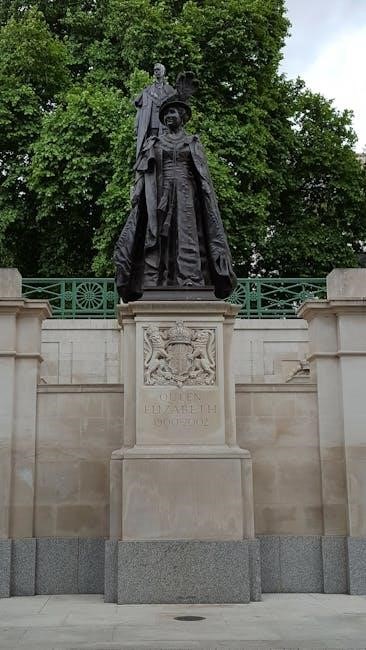The Tilbury Speech, delivered by Queen Elizabeth I in 1588, marks a pivotal moment in British history, rallying troops against the Spanish Armada and showcasing her exceptional leadership, leaving an enduring legacy․
Historical Significance of the Tilbury Speech
The Tilbury Speech, delivered by Queen Elizabeth I in 1588, holds immense historical significance as a defining moment in British history․ It rallied troops against the Spanish Armada, embodying Elizabeth’s leadership and resolve․ The speech underscored her trust in her people and willingness to lead by example, boosting morale and unifying the nation․ Its legacy endures as a symbol of courage and national identity, shaping England’s historical pride and resilience․
Overview of Queen Elizabeth I’s Role in English History
Queen Elizabeth I ruled England from 1558 to 1603, establishing herself as one of its most influential monarchs․ Known as the “Golden Age,” her reign saw cultural, economic, and political advancements․ Elizabeth successfully navigated religious conflicts, strengthened national identity, and fostered the arts․ Her leadership during the Spanish Armada threat, culminating in the Tilbury Speech, cemented her reputation as a strong, unifying force, leaving a lasting legacy in English history and culture․
The Spanish Armada and the Context of the Tilbury Speech
The Spanish Armada, sent by King Philip II of Spain in 1588, threatened England, prompting Queen Elizabeth I to rally her troops with her iconic Tilbury Speech․
The Threat of the Spanish Armada
The Spanish Armada, a formidable fleet assembled by King Philip II of Spain, posed a direct threat to England’s independence and Protestant identity in 1588․ Its invasion aim was to overthrow Queen Elizabeth I and restore Catholicism․ The Armada’s size and military prowess instilled widespread fear, prompting urgent preparations for defense․ This perilous situation set the stage for Elizabeth’s rallying Tilbury Speech, a pivotal moment in English history․
England’s Preparation for Invasion
England swiftly mobilized its defenses in response to the Spanish Armada’s approach․ Troops were assembled at Tilbury, Essex, under the command of the Earl of Leicester․ Elizabeth’s presence among her soldiers bolstered morale, demonstrating her commitment to the nation’s defense․ The queen’s leadership and strategic preparations underscored England’s resolve to repel the invasion, setting the stage for her iconic Tilbury Speech, which further unified the troops and solidified national determination․
Delivery of the Tilbury Speech
Queen Elizabeth I delivered the Tilbury Speech on August 9, 1588, at Tilbury, Essex, rallying her troops as the Spanish Armada threatened England’s shores, showcasing her resolute leadership and unwavering determination․
The Date and Location of the Speech
The Tilbury Speech was delivered by Queen Elizabeth I on August 9, 1588, at Tilbury in Essex, England․ This location was the assembly point for her land forces preparing to defend against the Spanish Armada’s invasion․ The speech took place on a critical day, as the Armada was already in the English Channel, heightening the urgency and significance of Elizabeth’s address to her troops․
The Circumstances Surrounding the Speech
The Tilbury Speech occurred during a time of high tension, as England faced the imminent threat of invasion by the Spanish Armada․ Queen Elizabeth I rode among her troops, dressed in armor, symbolizing her readiness to fight alongside them․ Her presence and words aimed to boost morale and unify the nation against a formidable enemy, creating a moment of profound national unity and resolve․

Key Themes and Messages in the Tilbury Speech
The speech emphasized trust in her people, courage, and national unity, inspiring resilience against the Spanish Armada, while showcasing Elizabeth’s leadership and willingness to fight․
Trust in Her People
Queen Elizabeth I expressed unwavering faith in her troops, declaring she did not wish to live if it meant distrusting her loyal subjects․ This trust fostered unity and resilience, as she emphasized shared responsibility and mutual loyalty․ Her words reinforced the belief that together, they could overcome any threat, embodying the strength of their collective spirit and determination․ This trust became a cornerstone of her leadership and a defining element of the speech․
Courage and Determination
Elizabeth I’s Tilbury Speech highlighted her own courage and determination, inspiring her troops to embrace the same spirit․ She famously declared she had the heart of a king, ready to fight alongside her soldiers․ Her resolve to lead by example and stand against the Spanish Armada energized her forces, transforming fear into valor and solidifying her reputation as a fearless leader․ Her words became a beacon of strength․
National Unity and Identity
Queen Elizabeth I’s Tilbury Speech fostered national unity by unifying her people against a common threat․ She portrayed England as a strong, cohesive nation, rallying support through shared identity and purpose․ Her rhetoric emphasized collective strength, blending national pride with religious duty, and reinforced the idea of England as a resilient, divinely favored realm․ This rhetoric helped shape a powerful image of English identity and resistance․
Rhetorical Strategies Employed by Queen Elizabeth I
Queen Elizabeth I skillfully used metaphor, emotional appeals, and symbolic language to inspire loyalty and courage among her troops, solidifying her reputation as a master orator․
Use of Metaphor and Symbolism
Queen Elizabeth I employed metaphors and symbolism to strengthen her message, comparing herself to a warrior leader and invoking the image of a united England․ By likening herself to “armed Pallas,” she symbolized wisdom and military prowess, while her presence among troops embodied the nation’s resilience․ These elements reinforced her authority and inspired loyalty, embedding her speech in historical memory as a symbol of leadership․
Appeals to Emotion and Patriotism
Queen Elizabeth I skillfully appealed to the emotions of her troops, fostering a sense of unity and shared purpose․ She emphasized trust in her people and a willingness to fight alongside them, evoking pride and loyalty․ By framing the defense of England as a collective endeavor, she stirred patriotism and a commitment to their nation’s survival, transforming the moment into a defining act of national identity․

Impact of the Tilbury Speech
The Tilbury Speech significantly boosted troop morale, uniting soldiers in determination and loyalty․ It reinforced Elizabeth’s image as a strong leader, symbolizing national unity and resilience against invasion, leaving a lasting imprint on British history and identity․
Effect on Troop Morale
The Tilbury Speech significantly boosted troop morale, inspiring unity and determination․ Elizabeth’s assurance of trust and her metaphor of wearing the “armor of courage” energized soldiers, fostering loyalty and readiness to defend England against the Spanish Armada․ Her presence and words transformed fear into resolve, embodying the spirit of national defense․
Historical Consequences of the Speech
The Tilbury Speech solidified Elizabeth’s reputation as a strong leader, uniting England against foreign threats․ The defeat of the Spanish Armada followed, securing English independence and establishing its naval dominance․ The speech became a symbol of national pride, shaping English identity and leaving a lasting impact on British history, remembered as a defining moment of courage and leadership․
Historical Interpretations of the Tilbury Speech
The Tilbury Speech has been interpreted as a masterful display of leadership, blending patriotism and personal courage, while some scholars debate its authenticity and historical context․
Different Perspectives on Its Significance
The Tilbury Speech is viewed as a pivotal moment in British history, with scholars highlighting its role in uniting the nation and showcasing Elizabeth’s leadership; However, debates persist regarding its historical accuracy and the extent of its impact․ Some see it as a symbol of English identity, while others analyze its portrayal in literature and film, emphasizing its enduring cultural significance and the pride it instills in national heritage․
Popular Cultural Representations of the Tilbury Speech
The Tilbury Speech has been immortalized in literature, film, and art, with depictions ranging from dramatic re-enactments to artistic interpretations, cementing its cultural impact and historical significance․
In Film, Literature, and Art
The Tilbury Speech has been vividly portrayed in films, literature, and art, capturing its historical significance․ In cinema, dramatic re-enactments bring Elizabeth’s courage to life, while literary works often highlight her rhetorical brilliance․ Artistic depictions frequently illustrate her iconic presence at Tilbury, symbolizing national pride․ These representations underscore the speech’s enduring impact on British culture and identity, making it a timeless symbol of leadership and resilience․
Comparison with Other Notable Speeches by Queen Elizabeth I
The Tilbury Speech stands alongside Elizabeth’s other renowned addresses, such as the Golden Speech, in showcasing her mastery of rhetoric and emotional appeal, each unique yet powerful․
Contrast with the Golden Speech
While the Tilbury Speech was a stirring call to arms during the Spanish Armada threat, the Golden Speech, delivered in 1601, focused on Elizabeth’s gratitude to Parliament and national unity․ Both showcased her rhetorical brilliance but served different purposes: Tilbury emphasized courage and collective defense, whereas the Golden Speech highlighted mutual respect and prosperity, reflecting the evolution of her reign․
Queen Elizabeth I’s Tilbury Speech rallied troops against the Spanish Armada, emphasizing trust, courage, and unity, leaving a lasting legacy in British history․
Key Points and Quotations
The Tilbury Speech emphasizes trust in her people, courage, and national unity․ Elizabeth famously declared, “I do not desire to live to distrust my faithful and loving people,” showcasing her confidence․ She also stated, “I know I have the body of a weak and feeble woman, but I have the heart and stomach of a king,” symbolizing her determination․ These quotations highlight her leadership and enduring legacy․

Legacy of the Tilbury Speech
The Tilbury Speech remains a defining moment in British history, symbolizing courage and national identity, and continues to inspire future generations with its enduring influence․
Its Enduring Influence on British History
The Tilbury Speech’s impact on British history is profound․ It solidified Queen Elizabeth I’s reputation as a courageous leader and symbol of national unity․ The speech inspired future generations, shaping Britain’s identity and resilience․ Its themes of trust, courage, and patriotism remain timeless, influencing political rhetoric and cultural narratives․ The speech is celebrated as a testament to Elizabeth’s leadership and England’s defiance against invasion․
Cultural Significance of the Tilbury Speech
The Tilbury Speech embodies English identity and historical pride, symbolizing resilience and unity․ It remains a cornerstone of British cultural heritage, inspiring art, literature, and film, celebrating Elizabeth’s leadership and the nation’s spirit․
Symbol of English Identity and Historical Pride
The Tilbury Speech is a powerful emblem of English identity, reflecting the nation’s resilience and unity․ Delivered during a time of crisis, it solidified Elizabeth I’s image as a strong leader, embodying the spirit of her people․ The speech has become a cultural touchstone, celebrated in art, literature, and film, symbolizing historical pride and enduring patriotism․ Its legacy continues to inspire, fostering a sense of shared heritage․
The Tilbury Speech remains a testament to Elizabeth I’s leadership, inspiring courage and unity․ It stands as an enduring symbol of resilience and national pride․
Final Thoughts on the Importance of the Tilbury Speech
The Tilbury Speech underscores Queen Elizabeth I’s remarkable ability to inspire and unify her people during a critical moment in history․ By addressing her troops with courage and conviction, she not only bolstered morale but also cemented her legacy as a strong and beloved leader․ The speech remains a powerful symbol of resilience, patriotism, and effective leadership․

Authenticity of the Tilbury Speech
The speech’s authenticity is debated due to two versions, with some questioning its accuracy, though its historical significance remains undiminished․
Discussion on the Two Versions of the Speech
The Tilbury Speech exists in two versions, sparking debate over its authenticity․ One version emphasizes Elizabeth’s martial spirit, while the other highlights her trust in her people․ Scholars argue that the variations may stem from contemporary reporting or later embellishments․ Despite these discrepancies, both versions underscore the speech’s pivotal role in rallying troops and cementing Elizabeth’s legacy as a strong, unifying leader․
